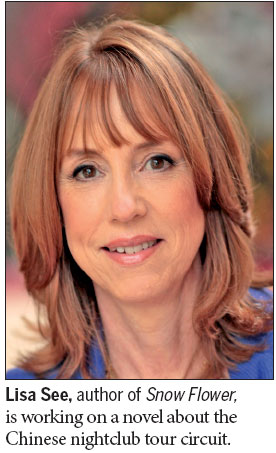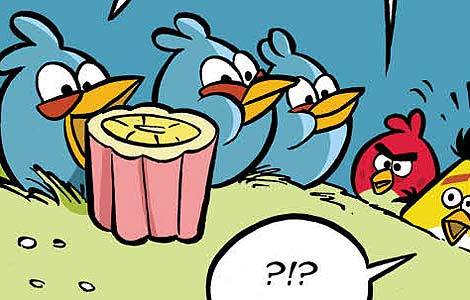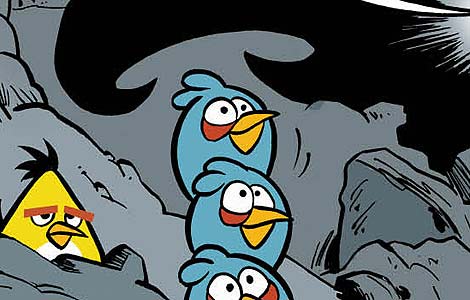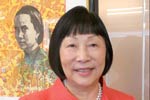Author uses history to detail women's plight
Updated: 2011-09-23 11:24
By Kelly Chung Dawson (China Daily)
|
|||||||||
When Chinese-American author Lisa See sat down to watch the recently released film adaptation of her 2005 best-selling book Snow Flower and the Secret Fan, it wasn't quite as she'd imagined. With her agreement, film producers had added a modern storyline following the parallel friendship of two present-day Shanghai girls. The result was a beautiful film, but to call it a true adaptation might not be accurate, she said in an interview with China Daily.
"When you read something you're often creating a movie in your own mind of what the characters look like, what it smells like, and what it sounds like," she said. "I think that as an artist, I passed a piece of work to another artist, the director, and the movie is naturally his interpretation and aesthetic filtered through his life experiences."
Directed by acclaimed Joy Luck Club director Wayne Wang and starring Li Bingbing ("the Meryl Streep of China," as See described her) and South Korean actress Gianna Jun, the film premiered in July. Florence Sloan and Wendi Deng Murdoch, the wives of ex-MGM CEO Harry Sloan and News Corp CEO Rupert Murdoch, respectively, produced the film.
The decision to modernize the adaptation was, in part, a business one, See said. American audiences are less likely to watch subtitled period pieces, she said. Fortunately, the parts of the film that follow the book are very true to the original story, the result of extensive research and attention to detail by the filmmakers, she said.

"The women I wrote about went through a lot in their lifetimes and I wanted that to be honored," she said. She described one scene in the movie which had featured a woman stirring a pot of rice, a small inaccuracy in food preparation that she was quick to correct in talks with the filmmakers.
See is currently promoting a new book titled Dreams of Joy, a sequel to 2009's Shanghai Girls. The book depicts a young Chinese-American woman who leaves America to pursue her ideals right before the advent of the "cultural revolution" (1966-1976). Her mother, certain that her daughter is leaping to her death, follows her to China in hopes of bringing her back to the West.
Although not much has been written on the subject, large numbers of overseas Chinese returned to China during that time, and many later escaped as massive famine overtook the country. Untold stories attract See, she said. In Shanghai Girls, See wrote about the American Confession Program of 1957, in which Chinese who had arrived in America as illegal "paper sons" were promised citizenship if they confessed their illegal status and shared information about friends and other community members. The program tore communities and families apart, See said.
"I'm attracted to stories that are covered up," she said. "The great leap forward and this idea of what China was like in those years and how closed or open it was, that attracted me," she said. "I felt with both (Shanghai Girls and Dreams of Joy) that I wanted to write about these subjects because the people involved are only getting older."
In writing about the Cultural Revolution, See goes into great detail about the suffering and difficulty of life during that period, but she also felt a need to right the misconception that China was entirely closed off, she said.
"Many Chinese and Westerners traveled into China during that time," she said. "Our perception of China being completely closed, and that Nixon was the one who actually opened China, I think that's somewhat of a misconception."
See, who is one-eighth Chinese and grew up in Los Angeles, spent a lot of her childhood with her father's Chinese relatives. After working as a journalist for the first part of her career, she began researching her family's history for her first book, On Gold Mountain: The One-Hundred-Year Odyssey of My Chinese-American Family (1996).
"I had this realization that we learn about history in terms of war and dates, but it's actually something that happens to individuals," she said. "Did they fail? Did they rise to the occasion? I realized I could tell a story about the history of America using my family, and that changed my life, because I really felt that there was so much to write about with the Chinese and Chinese-American experience. I could write about women, I could write about things that had been lost or forgotten or deliberately covered up. I've always felt compelled to find those stories and write about them in a way that people will connect to."
Women's stories are a continued theme in her work. In Snow Flower, the main characters communicate in a secret language called Nushu. She discovered the practice while reading about foot-binding, and was shocked that so few people knew about it.
"I thought it was so extraordinary, the only writing system in the world exclusively for women," she said. "I couldn't believe that all women didn't know about this. I became obsessed."
In Dreams of Joy, See writes about the experience of women during the Cultural Revolution. In 1949, Mao passed The Marriage Law, which banned the practice of polygamy, the possession of concubines, and required women to work as men did. Many view this as having been a practical decision, as double the hands could accomplish double the work. But in terms of women's rights, the move was a huge step forward, See said.
"I think that China was much more advanced in terms of fast change in equal rights for women than other countries," she said. "In 1949, Mao said, 'Women hold up half the sky,' and whether you wanted to or not, you had to participate in the growth of the nation.
"I think given where China was at that time, the vast numbers of people, and with thousands of years of tradition of how women were treated - the change that occurred for women's rights could only have happened on a national scale being led by the government. Was it completely successful? No, but is it successful here? Women may hold up half the sky, but they hold up a lesser half. That's true here, in England, in Brazil - that's just true everywhere."
See pointed to the media reaction when Deng slapped Murdoch's pie-throwing attacker in court during the News Corp trial in July.
"As soon as that happened, I knew that she would be labeled 'The Tiger Wife', " See said. "There are pervasive stereotypes about Chinese women - on the one hand, they are long-suffering obedient wives. On the other hand, there is the Dragon Lady Madame Mao ferocious woman stereotype. But ultimately, I don't think that what she did in court had anything to do with her being Chinese.
See, who spent several days with Deng while promoting the movie, described her as a "tough, strong woman."
On the subject of women, See recounted that Li Bingbing had told her that the film adaptation of Snow Flower was being described in China as "the Chinese Brokeback Mountain", she said with a laugh.
The original book had a scene in which the girls had written on each other's naked backs, but See had not intended it to be anything but innocent, she said.
"The writing of Nushu was written in a very heightened, emotional way," she said. "It's easy to interpret this writing from 200 years ago as being between women who were more than friends. You see that heightened tone in letters between women in the American Wild West too."
The movie seems to play these undertones in a more overt way, depicting one of the characters as being fiercely possessive of the other. Wang reassured See that he had only hoped to depict the characters as being truly loving in their friendship.
See has a "Laotong" friendship (as the friendship between the women in Snow Flower is called) of her own with another famous Chinese-American writer, Amy Tan. The two traveled to China together to research books.
"Our relationship is also through writing, so we're like Laotong that way," See said. "I consider her to be one of my closest friends, and it's wonderful to have a friend who is also a writer. We often write about similar subjects, and we are extraordinarily supportive of each other.
See is currently working on a new novel, which will focus on the Chinese nightclub tour circuit in America during the 1930s and 1940s, she said. She continues to write about Chinese history because she feels that it's important that Americans understand China beyond its current status as a global economic superpower, she said.
China Daily










